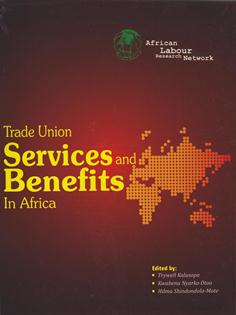
FOREWORD
Most trade unions in the world exist for historical and ideological reasons of advancing the cause of workers and the society at large. They engage the working social and economic order and may either accept the existing economic order or work within that order to achieve a favourable set of economic terms and employment conditions, or they may seek to overthrow the existing [political and] economic system and replace it with another. In Africa, trade unions emerged as a response to the despotic capitalist colonial order. The post-independence embrace of the enclave economies coupled with the implementation of Structural Adjustment Programmes (SAPs) in most African countries since the 1980s created a labour market that is characterised by exclusion in terms of low wages, poverty and inequality. The intricate connections between colonialism, post-colonialism and capitalism forced African trade unions to broaden the scope of their struggles beyond the shop floor and embrace liberation, democracy and promotion of economic development and social reconstruction.
Like most other regions of the world, the labour movement in Africa is facing severe challenges from the impact of neo-liberal globalisation. Neo-liberal globalisation has resulted in the erosion of formal employment, the traditional base of trade unions. It is characterised by relaxation and regulation of state authority and a shift to market regulation. In line with this dispensation, many African governments have over the years adopted economic liberalisation programmes. This has had a profound impact on the labour markets and has resulted in massive decline of the labour movement in terms of membership strength. Trade unions are thus facing a formidable challenge in organising workers in these new forms of employment.
This book could not have come at any other right time than now when trade unions are struggling to remain relevant to their members and society at large. The book underscores the important fact that the realisation of the trade union ideals can only be accomplished if they are able to organise their membership effectively and adapt to the current challenges. This means trade unions in Africa need to re-orient their operations so that workers can see the true benefits of labour collectivism and solidarity. Trade unions should thus stimulate and rekindle that spirit of union organization so as to bring workers together, modernise and provide services and benefits that reflect changing needs and times. We therefore require a labour movement in Africa that yearns to translate obstacles into opportunities and workers’ struggles into realism. We need a trade union movement that stands unwavering in the face of current systematic assaults on workers’ rights and human freedoms in the guise of globalisation. Trade unions should reconnect and redefine the workers’ fight and their songs of despair and instil a sense of hope, dignity, self-pride and liberation among the workers.
SATUCC welcomes this book and therefore hopes that it will assist trade unions in the SADC and the whole of Africa to go soul searching for the real and true workers’ victory.
Austin C. Muneku, Executive Secretary : Southern Africa Trade Union Co-ordination Council (SATUCC)
